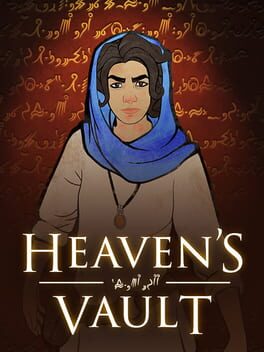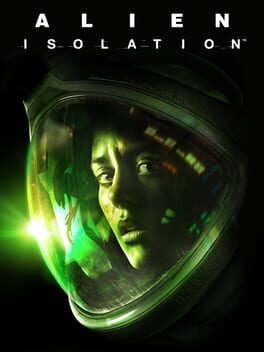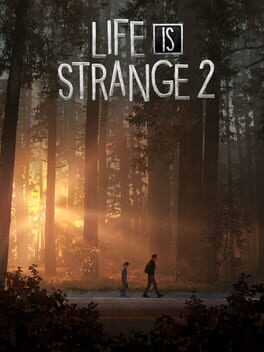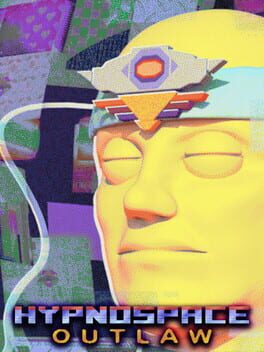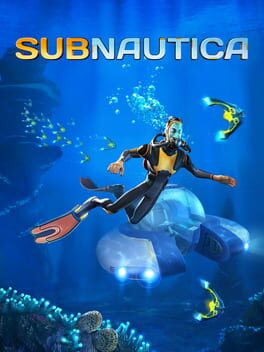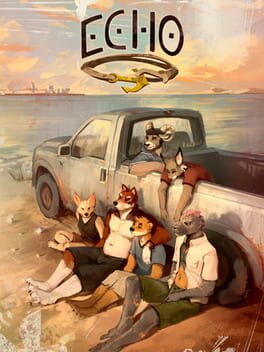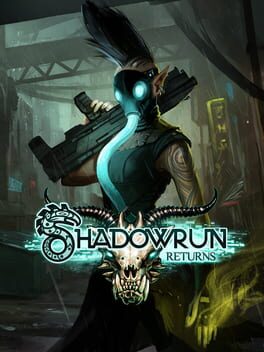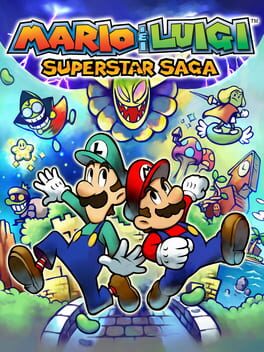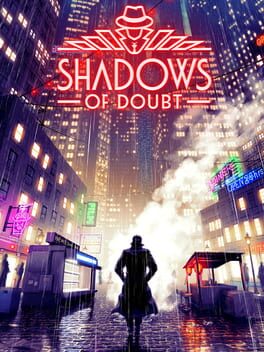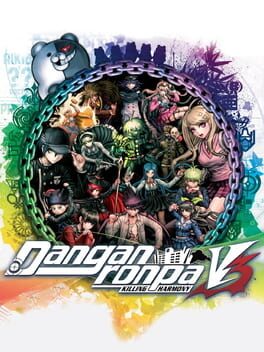Shymain
2017
Instinctively, I want to love this game. I want to give it a perfect rating and gush about how incredibly interesting the design of this brutal and uncompromising world is, how emergent and complex the interactions between all the creatures are, how satisfying it is to slowly master the world around you so that not only can you survive -- a real accomplishment when compared with the initial cycles of the game -- but deftly navigate wherever you want, weaving around enemies, grabbing items, filling your stomach, and understanding the world inside and out. I want to say all these things are true about the game because that's the sense that I had about the game in the first 2 or 3 of the 10 hours that I played this game before dropping it.
But ultimately, in all of those areas where the game at first feels incredibly deep and fresh and engaging, I started to realize that everything was surface-deep at best. For example, fans rave about the complex systems of interaction that occur between different creatures, but after some observation in the game, it became apparent that by "complex" they meant "emergent," and I very quickly became bored by the fact that everything functioned on incredibly simple rulesets with a large heap of randomness. Is this natural? I think so, yes, and if this game were a nature simulator, that would be a great feat. But this game is a survival platformer. This does not particularly feel satisfying or interesting to me for the purposes of a survival platformer, it feels lazy and frustrating and lacking in the intentionality and design that make the best games in both of those genres the best .
This is, in fact, a recurring theme in how I felt about this game. As a survival platformer (or generally as a game altogether) many of the design choices fail to make any sense whatsoever to me. They make all the sense in the world if this game is ambivalent about being a game altogether -- and largely I think that was the intent behind much of the game. Certainly that is the sentiment I see emerge from fan discussions that I read while trying to understand why I wasn't clicking with the game. As such, I think the creators of this game and I fundamentally just disagree on what makes a good game. And that's deeply unfortunate, because this was a game that from the first I heard about it, I wanted to love.
Revisiting the point of randomness briefly, I want to discuss difficulty. I did not ever find this game hard in the span of my time with it, although I certainly found it frustrating at times. By pure chance my gameplay style of grabbing food items, sprinting through areas as fast as I can without dying, and making a beeline for the first new shelter I discovered was a winner, and not once during that normal pattern of gameplay did I die to the rain, although I found myself backtracking to known shelters once or twice when I failed to find a new one sufficiently fast. I did, however, die a number of times to the creatures in the world. Generally I found this not to be punishment for playing the game poorly so much as sheer bad luck to stumble upon a room where it just so happened that the creatures were positioned so as to pounce upon me before I realized what had happened -- on returning to these locations, the creatures were positioned differently and that plus my newly acquired knowledge meant I functionally never died to a known enemy. I died to random chance. In many cases, this wasn't frustrating, as in the situation described above. That just happens in this game, and I did not consider it a fail state given the flowers (a legitimately cool piece of game design for a number of reasons!) which protected my cycle "streak." What was, however, frustrating was when I found myself unable to progress due to completely uncooperative rideable creatures in several areas, or when a creature parked itself right where I needed to parkour and refused to move no matter my attempts to manipulate it -- these things also just happen due to the nature of the game, but they're frankly just bad, time-wasting pieces of game design that I did not enjoy. When I made it past obstacles of this kind, it did not feel like it was due to any improvement of my own, and ultimately one particularly tedious instance of this resulted in me completely shelving the game. This game is, in my opinion, not particularly difficult if you engage with it the way it wants you to, and I want to be clear that my problems with the game are not in fact because it is "too hard" or anything of the sort, but because of cases of what I believe to just be bad game design.
Some of the things about this game's design I do find legitimately engaging. I generally love when games do not tell me anything at all and want me to figure out what they are and how they function. The little companion fly guy that follows you around somewhat undercuts this piece of design in several places, which is incredibly strange to me because it is very easy to get off the intended path and not realize it. If you follow the path, he tells you what many of the items are and how to use them and what they do. If you don't, then you're completely on your own. This feels like an incredibly half-assed system and it makes the game actively worse. Specifically, the fact that this system is present meant that the developers seemed to feel there was largely no need to make items naturally interact with the world around them (or rather, to have creatures interact with the varying items -- spears are the main exception here). But because it's so easy to inadvertently miss out on the tutorial system, you are left with no natural clues as to what to do to interact with the world around you, leaving you to simply guess and experiment. This is, at best, a passable approach to being a game that never tells you how to play it, because the best of those games guide you from just below the surface while making the player feel as if they were unassisted the whole time. And unfortunately, even this passable approach feels unintentional given the inclusion of the tutorial guy, which begs the question: Why in the world does the UI go completely unexplained? I personally found it fairly intuitive, thankfully, but from what I saw in discussions about the game, many people had no clue what the UI was supposed to indicate. That is a failing on the part of the game.
In fact, it is a truly puzzling piece of design that there are non-diegetic elements in the game at all. It seems like it wants to be an immersive environmental simulator in many ways, including forcing you to figure out how the world around you functions, how your character moves (there's a TON of hidden movement that can largely only be figured out by pure luck or, as with most players, by reading about it online), and what your objective in the game even is . In that case, any mechanical complexities such as the survival cycle should be implemented into the world itself somehow! But then on the other hand you have the weird tutorial system, which suggests that this game actually wanted you to be told how to do many of the things in it, and if you're going that far then why not clarify one of the most basic mechanics of the game? Baffling is the only word I have for this -- it feels like the development team for this game was split in half on how they should fundamentally approach what this game is and how it is told, and they ended up with a half-conceptualized amalgamation of two far better games.
It is undeniably true that Rain World is unique, that it is ambitious, and that much about it is deeply interesting as a piece of interactive media. I find it hard to ever be truly negative about this game because I so deeply want to be drawn into it in the ways that many other people are. But other games exist that are also brutal and obtuse and tell you nothing about them and challenge you to engage with deep and interlocking systems in order to understand what the game is and how to play it, and they succeed in making me love them by virtue of being incredibly carefully crafted and well-thought out pieces of game design. As much as I regret to say it, for me, Rain World fails to live up to what it wants to be.
But ultimately, in all of those areas where the game at first feels incredibly deep and fresh and engaging, I started to realize that everything was surface-deep at best. For example, fans rave about the complex systems of interaction that occur between different creatures, but after some observation in the game, it became apparent that by "complex" they meant "emergent," and I very quickly became bored by the fact that everything functioned on incredibly simple rulesets with a large heap of randomness. Is this natural? I think so, yes, and if this game were a nature simulator, that would be a great feat. But this game is a survival platformer. This does not particularly feel satisfying or interesting to me for the purposes of a survival platformer, it feels lazy and frustrating and lacking in the intentionality and design that make the best games in both of those genres the best .
This is, in fact, a recurring theme in how I felt about this game. As a survival platformer (or generally as a game altogether) many of the design choices fail to make any sense whatsoever to me. They make all the sense in the world if this game is ambivalent about being a game altogether -- and largely I think that was the intent behind much of the game. Certainly that is the sentiment I see emerge from fan discussions that I read while trying to understand why I wasn't clicking with the game. As such, I think the creators of this game and I fundamentally just disagree on what makes a good game. And that's deeply unfortunate, because this was a game that from the first I heard about it, I wanted to love.
Revisiting the point of randomness briefly, I want to discuss difficulty. I did not ever find this game hard in the span of my time with it, although I certainly found it frustrating at times. By pure chance my gameplay style of grabbing food items, sprinting through areas as fast as I can without dying, and making a beeline for the first new shelter I discovered was a winner, and not once during that normal pattern of gameplay did I die to the rain, although I found myself backtracking to known shelters once or twice when I failed to find a new one sufficiently fast. I did, however, die a number of times to the creatures in the world. Generally I found this not to be punishment for playing the game poorly so much as sheer bad luck to stumble upon a room where it just so happened that the creatures were positioned so as to pounce upon me before I realized what had happened -- on returning to these locations, the creatures were positioned differently and that plus my newly acquired knowledge meant I functionally never died to a known enemy. I died to random chance. In many cases, this wasn't frustrating, as in the situation described above. That just happens in this game, and I did not consider it a fail state given the flowers (a legitimately cool piece of game design for a number of reasons!) which protected my cycle "streak." What was, however, frustrating was when I found myself unable to progress due to completely uncooperative rideable creatures in several areas, or when a creature parked itself right where I needed to parkour and refused to move no matter my attempts to manipulate it -- these things also just happen due to the nature of the game, but they're frankly just bad, time-wasting pieces of game design that I did not enjoy. When I made it past obstacles of this kind, it did not feel like it was due to any improvement of my own, and ultimately one particularly tedious instance of this resulted in me completely shelving the game. This game is, in my opinion, not particularly difficult if you engage with it the way it wants you to, and I want to be clear that my problems with the game are not in fact because it is "too hard" or anything of the sort, but because of cases of what I believe to just be bad game design.
Some of the things about this game's design I do find legitimately engaging. I generally love when games do not tell me anything at all and want me to figure out what they are and how they function. The little companion fly guy that follows you around somewhat undercuts this piece of design in several places, which is incredibly strange to me because it is very easy to get off the intended path and not realize it. If you follow the path, he tells you what many of the items are and how to use them and what they do. If you don't, then you're completely on your own. This feels like an incredibly half-assed system and it makes the game actively worse. Specifically, the fact that this system is present meant that the developers seemed to feel there was largely no need to make items naturally interact with the world around them (or rather, to have creatures interact with the varying items -- spears are the main exception here). But because it's so easy to inadvertently miss out on the tutorial system, you are left with no natural clues as to what to do to interact with the world around you, leaving you to simply guess and experiment. This is, at best, a passable approach to being a game that never tells you how to play it, because the best of those games guide you from just below the surface while making the player feel as if they were unassisted the whole time. And unfortunately, even this passable approach feels unintentional given the inclusion of the tutorial guy, which begs the question: Why in the world does the UI go completely unexplained? I personally found it fairly intuitive, thankfully, but from what I saw in discussions about the game, many people had no clue what the UI was supposed to indicate. That is a failing on the part of the game.
In fact, it is a truly puzzling piece of design that there are non-diegetic elements in the game at all. It seems like it wants to be an immersive environmental simulator in many ways, including forcing you to figure out how the world around you functions, how your character moves (there's a TON of hidden movement that can largely only be figured out by pure luck or, as with most players, by reading about it online), and what your objective in the game even is . In that case, any mechanical complexities such as the survival cycle should be implemented into the world itself somehow! But then on the other hand you have the weird tutorial system, which suggests that this game actually wanted you to be told how to do many of the things in it, and if you're going that far then why not clarify one of the most basic mechanics of the game? Baffling is the only word I have for this -- it feels like the development team for this game was split in half on how they should fundamentally approach what this game is and how it is told, and they ended up with a half-conceptualized amalgamation of two far better games.
It is undeniably true that Rain World is unique, that it is ambitious, and that much about it is deeply interesting as a piece of interactive media. I find it hard to ever be truly negative about this game because I so deeply want to be drawn into it in the ways that many other people are. But other games exist that are also brutal and obtuse and tell you nothing about them and challenge you to engage with deep and interlocking systems in order to understand what the game is and how to play it, and they succeed in making me love them by virtue of being incredibly carefully crafted and well-thought out pieces of game design. As much as I regret to say it, for me, Rain World fails to live up to what it wants to be.
2019
What a weird-ass game this one is. I highly recommend it just for how unique and imaginative (a legitimately rare trait when it comes to games!) it is, despite it also being slow and clunky and often a time-waster. You get to decipher a conlang which is cool as shit despite it being a fairly shallow one, but I assume that was required to make this work as a full game. This game is very organic and your playthrough will not be the same as mine, or anyone else's, from what I've seen.
2014
2018
I am not a man. For most of my life, approximately the first twenty years of my existence, I identified as one, and it seems likely that unless I radically change who I am to hide behind the aesthetics of androgyny, I will always be externally identified as a man by those around me. To escape a bioessentialist lens of analysis in our society is near impossible -- it is a lens that permeates even my internal self, leads me to question whether I am really non-binary or simply afraid of being labeled as a man, and by such label being condemned as inherently violent, hateful, and dominating. I despise patriarchal masculinity for the ways in which it has defined the world around me, shaping my relationships with my parents, friends, classmates, and partners, continually seeking to shunt me into a role which I have always found repulsive. I am not a man, and yet it seems impossible for me to exist without the baggage of maleness.
All this is to say that my relationship with masculinity and maleness is a strange and complicated one. At once I want to disavow it and reclaim it. To do either, or both, or neither requires that I understand masculinity better, that I understand boyhood better, that I find a means by which to deconstruct the patriarchal and toxic frameworks in which these experiences have been shaped, and that an alternate model -- a positive, feminist masculinity -- must take their place.
Within communities centered around the Life is Strange series of games in the several years following Life is Strange 2's release, a common criticism was often levied of the game that I could not seem to understand. The sentiment was, roughly, that Life is Strange was a series about women -- Max, Chloe, Rachel -- and that to write a new game in the series and center it around male protagonists was a step back. Yet another story about men! How tiring. It took me a long time to figure out why, exactly, this criticism rang so hollow, even though in other contexts I would agree with this same piece of criticism about other pieces of media. As someone who would consider themselves an intersectional feminist, diversity in media is something I value -- to have a series centered around the internal experiences of not just women but specifically sapphic women in a landscape of gaming dominated by stories of men was something that I felt was an achievement by Life is Strange.
In an all-too misogynist media sphere, Life is Strange was a breath of fresh air, a piece of media that aimed to take seriously and capture the internal lives of teenage girls -- one of the most maligned groups in the popular consciousness! -- and for doing such, it received extreme criticism in the public eye. There's much to be said about how Life is Strange breaks down the typical archetypes of teenaged femininity, presenting a cast of young women who at first glance fit easily into typical tropes of the cheerleader, popular girl, nerd, manic pixie dream girl, and then going out of its way to humanize those characters and deconstruct those tropes. This, of course, is a prime reason why so much male hatred was directed at the series -- if you were on the internet at any point during Life is Strange's release, it was impossible to avoid accusations levied at Life is Strange of being an "extremist SJW toxic feminist" game. As teenage girls in real life have been mocked for their patterns of speech, so the same was replicated in the virtual space with an absurd assertion that the regionally accurate slang was "cringe" and stupid. It was one of the games picked up by Gamergate as an icon for how "far-leftism is coming for your vidya." All of this for presenting women as humanized characters in a video game!
But this is exactly why this criticism of Life is Strange 2's protagonists fell short for me -- Life is Strange is not a series about women, but a series written from a strongly feminist lens, and feminism cannot exist as a substantial framework of analysis if it only has room for one of the sexes. Feminism is a radical rejection of the patriarchal norms which shape and define our society. It is an insistence that we do not need the patterns of male domination and violence which have come to be implicitly accepted as natural -- more than that, it insists that these patterns are harmful to every person in our society. An analysis, deconstruction, and positive reconstruction of masculinity is not going above and beyond the bounds of what feminism is supposed to be, but is crucial to any feminist project that would seek to abolish patriarchy once and for all.
This brings us to Life is Strange 2. The core conceit of this game is that two young Hispanic brothers, Sean and Daniel, witness their dad being shot by a police officer. In reaction to this, Daniel suddenly gains powers, and in a moment of overwhelming grief and rage, he kills the police officer, without knowing that he did any such thing. The series begins from this point on, the two brothers weaving their way across the west coast of the United States, traveling from their now-abandoned home in Seattle to Mexico in pursuit of freedom from the ever-looming violent hand of the criminal justice system. There is much to say about the obvious racial politics of this game, which are largely transparent and at times lacking in nuance, but it seems to me that the racial politics of this game are more of a mechanism than anything else. They create an impetus for the brothers to leave their home and define a goal for the brothers to pursue, but the real meat of the game is everything in between those two points. In-between those two points is a story about brotherhood, love, family, and masculinity, one which I believe is often overlooked by people when they engage with this game, and one which I think is an incredibly lacking narrative in much of the medium of gaming to this day. Life is Strange 2 is the rare game that explores feminism by positing what a positive model of masculinity and male connection can and should look like.
It would, perhaps, be too trite to step event by event, or even episode by episode through this game and notate the precise ways in which this analysis is done. It is easy to point to the traumas that the Diaz brothers experience and how those make them shut out their emotions, how they (especially Daniel, but both of them at times) seek control over their life with violence and domination, and how Sean's initial instinct towards patriarchal masculinity alienates his brother. It is easy to note that from the very first episode, we see a complex mix of positive and toxic masculinites expressed in the people that Sean and Daniel meet on the road who help them and hurt them, connect with them and steal them away from one another. I think once you're aware that the game is using this lens of analysis in its writing, much of this falls into place naturally, and I believe there's significant value in revisiting the game to see what ideas about masculinity it presents for yourself. For me to prime others to see the exact same messages that I see would be a mistake, as it is not often that we have the chance to critically engage with pieces of media that recognize the toxic nature of patriarchal masculinity and are interested in showing us a image of what positive masculinity can be. To steal that chance away from you, the reader, would be a legitimate shame.
And yet, I cannot help but express the absolute beauty that I find in Episode 3 when this lens of analysis clicks into place and everything suddenly becomes more clear than it has ever been! In the midst of a journey full of pain and hatred and violence and rage, where the brothers fight not only with the world around them, not only between one another, but with their own internal selves, the third episode is a sudden break away from the patterns that have dominated the lives of Sean and Daniel, the structures that have defined our own lives. For a brief moment, Sean sees what life could be like free of the baggage of the patriarchal scars that he's been burdened with for his own life! It is a vision of community and family and love, where he yields his need to control and dominate his life and allows himself to open to the people around him. He sits quietly next to Cassidy and watches her play guitar. He talks earnestly and emotionally with Finn. At some point Sean and I blur into one. I walk around the camp with Daniel and do chores together and finally, at long last, two states away from his home, Sean treats his brother like someone he loves and respects rather than an annoyance to be cast away. We stop being afraid of our brother's potential to hurt. We kiss Finn. We go on night swims and help Daniel train his powers and it seems like finally we're free of all the suffering, that we've broken the cycle of the violence and estrangement innate to our lives under patriarchy!
But it is a brief moment, and no longer. All too easily the outside world and the norms and power structures rush back in and the episode ends again in violence and loss and rage, a patriarchal norm forced back onto its unwilling victims, and as Sean loses an eye and his brother runs off alone, I weep.
I am not a man. But over time I have come to think that it is impossible for me to extricate myself from the relationship to masculinity which has been foisted upon me by the world. The best I can hope for is to shape that relationship into something positive, something not corrupted by the sexism that eats at every aspect of our relationships to others and ourselves alike. Episode 3 is a snapshot of what that might look like, a haven from the world. It is written with a love of men and masculinity, it embraces of all the positive potential that they have, and it denies the insidious idea that the standards of patriarchy we live under are innate and biologically determined. It is wonderfully feminist, and in its quiet but firm commitment to a better masculinity, it is even a little bit radical.
I am not a man. I do not think I will ever be a man. But if this was what it meant to be a man -- perhaps I wouldn't be so terrified of being seen as one.
All this is to say that my relationship with masculinity and maleness is a strange and complicated one. At once I want to disavow it and reclaim it. To do either, or both, or neither requires that I understand masculinity better, that I understand boyhood better, that I find a means by which to deconstruct the patriarchal and toxic frameworks in which these experiences have been shaped, and that an alternate model -- a positive, feminist masculinity -- must take their place.
Within communities centered around the Life is Strange series of games in the several years following Life is Strange 2's release, a common criticism was often levied of the game that I could not seem to understand. The sentiment was, roughly, that Life is Strange was a series about women -- Max, Chloe, Rachel -- and that to write a new game in the series and center it around male protagonists was a step back. Yet another story about men! How tiring. It took me a long time to figure out why, exactly, this criticism rang so hollow, even though in other contexts I would agree with this same piece of criticism about other pieces of media. As someone who would consider themselves an intersectional feminist, diversity in media is something I value -- to have a series centered around the internal experiences of not just women but specifically sapphic women in a landscape of gaming dominated by stories of men was something that I felt was an achievement by Life is Strange.
In an all-too misogynist media sphere, Life is Strange was a breath of fresh air, a piece of media that aimed to take seriously and capture the internal lives of teenage girls -- one of the most maligned groups in the popular consciousness! -- and for doing such, it received extreme criticism in the public eye. There's much to be said about how Life is Strange breaks down the typical archetypes of teenaged femininity, presenting a cast of young women who at first glance fit easily into typical tropes of the cheerleader, popular girl, nerd, manic pixie dream girl, and then going out of its way to humanize those characters and deconstruct those tropes. This, of course, is a prime reason why so much male hatred was directed at the series -- if you were on the internet at any point during Life is Strange's release, it was impossible to avoid accusations levied at Life is Strange of being an "extremist SJW toxic feminist" game. As teenage girls in real life have been mocked for their patterns of speech, so the same was replicated in the virtual space with an absurd assertion that the regionally accurate slang was "cringe" and stupid. It was one of the games picked up by Gamergate as an icon for how "far-leftism is coming for your vidya." All of this for presenting women as humanized characters in a video game!
But this is exactly why this criticism of Life is Strange 2's protagonists fell short for me -- Life is Strange is not a series about women, but a series written from a strongly feminist lens, and feminism cannot exist as a substantial framework of analysis if it only has room for one of the sexes. Feminism is a radical rejection of the patriarchal norms which shape and define our society. It is an insistence that we do not need the patterns of male domination and violence which have come to be implicitly accepted as natural -- more than that, it insists that these patterns are harmful to every person in our society. An analysis, deconstruction, and positive reconstruction of masculinity is not going above and beyond the bounds of what feminism is supposed to be, but is crucial to any feminist project that would seek to abolish patriarchy once and for all.
This brings us to Life is Strange 2. The core conceit of this game is that two young Hispanic brothers, Sean and Daniel, witness their dad being shot by a police officer. In reaction to this, Daniel suddenly gains powers, and in a moment of overwhelming grief and rage, he kills the police officer, without knowing that he did any such thing. The series begins from this point on, the two brothers weaving their way across the west coast of the United States, traveling from their now-abandoned home in Seattle to Mexico in pursuit of freedom from the ever-looming violent hand of the criminal justice system. There is much to say about the obvious racial politics of this game, which are largely transparent and at times lacking in nuance, but it seems to me that the racial politics of this game are more of a mechanism than anything else. They create an impetus for the brothers to leave their home and define a goal for the brothers to pursue, but the real meat of the game is everything in between those two points. In-between those two points is a story about brotherhood, love, family, and masculinity, one which I believe is often overlooked by people when they engage with this game, and one which I think is an incredibly lacking narrative in much of the medium of gaming to this day. Life is Strange 2 is the rare game that explores feminism by positing what a positive model of masculinity and male connection can and should look like.
It would, perhaps, be too trite to step event by event, or even episode by episode through this game and notate the precise ways in which this analysis is done. It is easy to point to the traumas that the Diaz brothers experience and how those make them shut out their emotions, how they (especially Daniel, but both of them at times) seek control over their life with violence and domination, and how Sean's initial instinct towards patriarchal masculinity alienates his brother. It is easy to note that from the very first episode, we see a complex mix of positive and toxic masculinites expressed in the people that Sean and Daniel meet on the road who help them and hurt them, connect with them and steal them away from one another. I think once you're aware that the game is using this lens of analysis in its writing, much of this falls into place naturally, and I believe there's significant value in revisiting the game to see what ideas about masculinity it presents for yourself. For me to prime others to see the exact same messages that I see would be a mistake, as it is not often that we have the chance to critically engage with pieces of media that recognize the toxic nature of patriarchal masculinity and are interested in showing us a image of what positive masculinity can be. To steal that chance away from you, the reader, would be a legitimate shame.
And yet, I cannot help but express the absolute beauty that I find in Episode 3 when this lens of analysis clicks into place and everything suddenly becomes more clear than it has ever been! In the midst of a journey full of pain and hatred and violence and rage, where the brothers fight not only with the world around them, not only between one another, but with their own internal selves, the third episode is a sudden break away from the patterns that have dominated the lives of Sean and Daniel, the structures that have defined our own lives. For a brief moment, Sean sees what life could be like free of the baggage of the patriarchal scars that he's been burdened with for his own life! It is a vision of community and family and love, where he yields his need to control and dominate his life and allows himself to open to the people around him. He sits quietly next to Cassidy and watches her play guitar. He talks earnestly and emotionally with Finn. At some point Sean and I blur into one. I walk around the camp with Daniel and do chores together and finally, at long last, two states away from his home, Sean treats his brother like someone he loves and respects rather than an annoyance to be cast away. We stop being afraid of our brother's potential to hurt. We kiss Finn. We go on night swims and help Daniel train his powers and it seems like finally we're free of all the suffering, that we've broken the cycle of the violence and estrangement innate to our lives under patriarchy!
But it is a brief moment, and no longer. All too easily the outside world and the norms and power structures rush back in and the episode ends again in violence and loss and rage, a patriarchal norm forced back onto its unwilling victims, and as Sean loses an eye and his brother runs off alone, I weep.
I am not a man. But over time I have come to think that it is impossible for me to extricate myself from the relationship to masculinity which has been foisted upon me by the world. The best I can hope for is to shape that relationship into something positive, something not corrupted by the sexism that eats at every aspect of our relationships to others and ourselves alike. Episode 3 is a snapshot of what that might look like, a haven from the world. It is written with a love of men and masculinity, it embraces of all the positive potential that they have, and it denies the insidious idea that the standards of patriarchy we live under are innate and biologically determined. It is wonderfully feminist, and in its quiet but firm commitment to a better masculinity, it is even a little bit radical.
I am not a man. I do not think I will ever be a man. But if this was what it meant to be a man -- perhaps I wouldn't be so terrified of being seen as one.
2020
2019
This review contains spoilers
AREN'T YOU AFRAID TO DIE? the universe shouts. It challenges me with the end of everything, over and over and over again. When I discover for the first time that I can survive crashing into the sun, being separated from my ship on the other side of a black hole, drifting out into space until my oxygen runs out, I am thrilled. Nothing can stop me. I am immortal and I will uncover all this world has to offer. What could possibly get in my way?
And then the sun explodes for the first time. I notice it out of the corner of my eye, just an expanding sphere of fire, an ever-increasing roar -- by the time I realize what's happening, I have died and been reborn. Is this a random event? When I die for the second time to the supernova, I know that it is not. Even as I am granted the gift of immortality, the universe turns to balance that out by ensuring that I will die every 22 minutes. And so begin my desperate attempts to escape this fate. Without so much as a word to tell me what I must do, I know that I must explore every inch of this miniature solar system, uncover the secrets and history that lie underneath, and figure out how to stop the sun from exploding.
The beauty of this game is that the hopelessness of your task is right in front of you the whole time, if you only know where to look. It is not your star that is exploding -- it is every star. As each 22 minute lifetime comes to a close, you can look out upon the observable universe, and see your struggle repeated in miniature a million times over in the span of a few seconds. But you probably won't understand what this means. It's not really significant. You are immortal, you will last forever, and all you have to do is figure out how to either stop the sun from exploding, or escape beyond its reach.
And then you finally do it. You understand the intricacies of every planet in the solar system, the secrets of history locked away beyond the reach of any others, you go through hell and back, and you find a drive, a code, and a ship. Your heart starts to race as everything falls into place in your head. You can do it! You can fucking escape from here, run far away to where no explosion can ever reach you, and finally live beyond the 22 minute lifetime that you have repeated over and over and over again to the point that there is nothing left for you in it. All you have to do is risk your immortality. If you fuck it up, you're dead. It's all over. And when life is just within reach, death feels serious for the first time. You practice the necessary maneuvers, plot out your route, and sit by a campfire and die a peaceful death for the final time. And then you finally do it. You escape.
And the universe ends, despite it all. After dozens of deaths, death had stopped scaring me, right up until I made myself vulnerable and believed for the first time that I could live. Then death became the most terrifying prospect ever. AREN'T YOU AFRAID TO DIE? the universe shouted, and I gave my whole life to prevent my death. And I lost. I died one final time. Everything did.
And it was beautiful.
Because at the end of it all, I always would have died. No matter what you do, the world ends, and the life fades from your eyes. Even if it had just been my sun exploding, and I had escaped and lived until an old age in some distant galaxy circling a far younger star, I would have one day sat down and died. But I fucking fought with my whole being to prevent this inevitability. I uncovered millennia of history, explored an entire solar system, and bent the fundamental laws of physics to save myself from death. And I lost, but who fucking cares? I did everything I could, and along the way, I saw the beauty of the universe around me, befriended other travelers, even learned a little musical tune. And we played that tune together around a campfire while everything ended.
I died, but I could only ever have died because I FUCKING LIVED!
It was a brilliant explosion of light, color, sound -- a transcendent harmony of everything that ever was, sung by a chorus of loved ones, it was a moment that exceeded all physical experiences, indescribable by senses alone, and above all else, IT WAS -- and it was over before I knew it.
And after the universe dies, and everything is empty and cold, another one is born. It is born despite everything! It is beyond what any person could ever hope for, could ever possibly believe: Not a chance for us to live again, not even for our friends or family or species to live again, but for something else to experience the beauty of existence, and the welcoming arms of death. In the end, it was all worth it. Even if there was nothing after the end of the universe, our struggle would have been worth it. But despite the sheer impossibility of it all, life goes on.
And to the universe, I answer: Of course I am afraid to die! But I have lived, and others will live after me, and that is enough.
And then the sun explodes for the first time. I notice it out of the corner of my eye, just an expanding sphere of fire, an ever-increasing roar -- by the time I realize what's happening, I have died and been reborn. Is this a random event? When I die for the second time to the supernova, I know that it is not. Even as I am granted the gift of immortality, the universe turns to balance that out by ensuring that I will die every 22 minutes. And so begin my desperate attempts to escape this fate. Without so much as a word to tell me what I must do, I know that I must explore every inch of this miniature solar system, uncover the secrets and history that lie underneath, and figure out how to stop the sun from exploding.
The beauty of this game is that the hopelessness of your task is right in front of you the whole time, if you only know where to look. It is not your star that is exploding -- it is every star. As each 22 minute lifetime comes to a close, you can look out upon the observable universe, and see your struggle repeated in miniature a million times over in the span of a few seconds. But you probably won't understand what this means. It's not really significant. You are immortal, you will last forever, and all you have to do is figure out how to either stop the sun from exploding, or escape beyond its reach.
And then you finally do it. You understand the intricacies of every planet in the solar system, the secrets of history locked away beyond the reach of any others, you go through hell and back, and you find a drive, a code, and a ship. Your heart starts to race as everything falls into place in your head. You can do it! You can fucking escape from here, run far away to where no explosion can ever reach you, and finally live beyond the 22 minute lifetime that you have repeated over and over and over again to the point that there is nothing left for you in it. All you have to do is risk your immortality. If you fuck it up, you're dead. It's all over. And when life is just within reach, death feels serious for the first time. You practice the necessary maneuvers, plot out your route, and sit by a campfire and die a peaceful death for the final time. And then you finally do it. You escape.
And the universe ends, despite it all. After dozens of deaths, death had stopped scaring me, right up until I made myself vulnerable and believed for the first time that I could live. Then death became the most terrifying prospect ever. AREN'T YOU AFRAID TO DIE? the universe shouted, and I gave my whole life to prevent my death. And I lost. I died one final time. Everything did.
And it was beautiful.
Because at the end of it all, I always would have died. No matter what you do, the world ends, and the life fades from your eyes. Even if it had just been my sun exploding, and I had escaped and lived until an old age in some distant galaxy circling a far younger star, I would have one day sat down and died. But I fucking fought with my whole being to prevent this inevitability. I uncovered millennia of history, explored an entire solar system, and bent the fundamental laws of physics to save myself from death. And I lost, but who fucking cares? I did everything I could, and along the way, I saw the beauty of the universe around me, befriended other travelers, even learned a little musical tune. And we played that tune together around a campfire while everything ended.
I died, but I could only ever have died because I FUCKING LIVED!
It was a brilliant explosion of light, color, sound -- a transcendent harmony of everything that ever was, sung by a chorus of loved ones, it was a moment that exceeded all physical experiences, indescribable by senses alone, and above all else, IT WAS -- and it was over before I knew it.
And after the universe dies, and everything is empty and cold, another one is born. It is born despite everything! It is beyond what any person could ever hope for, could ever possibly believe: Not a chance for us to live again, not even for our friends or family or species to live again, but for something else to experience the beauty of existence, and the welcoming arms of death. In the end, it was all worth it. Even if there was nothing after the end of the universe, our struggle would have been worth it. But despite the sheer impossibility of it all, life goes on.
And to the universe, I answer: Of course I am afraid to die! But I have lived, and others will live after me, and that is enough.
2019
2019
an excellent game that makes me long for the days before the internet was just half a dozen social networks regurgitating content between one another like some sort of digital ouroboros. most of my time playing this was legitimately just clicking away at interesting links and then realizing an hour later that i had forgotten about my objective and i fucking loved it
2014
The first half of this game is absolutely incredible, and I loved the concept of “go deeper,” as the community puts it. Unfortunately, as soon as you get below 800m the game becomes incredibly linear and is over in a flash. I wish I’d had more of a reason to use a lot of the late game blueprints and technology.
2015
It's just Higurashi for furries.
I've played one route and that's really all I'm willing to give this game. It's not very good. I'm not super familiar with furry culture or media, but the sense that I got from all the main characters is that they're probably popular Archetypes for furry characters -- they're very recognizably written like Archetypes with tweaks. It's a very anime style of writing, and one I generally think is bad, because people (or animals, in the case of this game? not sure on the preferred nominative conventions here) are not just variations on themes, even if we often group ourselves together that way on the internet.
I didn't particularly like any of the main cast, which isn't really a dealbreaker -- you can have a cast of shitty characters and be engaging and entertaining all the same. Unfortunately, I didn't really find the main characters compelling at all either. I don't know why they were so poorly constructed, given that the secondary characters were vastly more interesting -- clearly the authors of this VN are capable of good character writing.
As it so happens, this is not the only indie western VN set in a small town with a quirky and diverse ensemble cast that quickly turns to psychological horror that I've played. Scarlet Hollow does the same thing (admittedly, without the furry romance, so that might be a dealbreaker for the target audience here) far more competently, which is probably why my feelings towards this game are so negative. I know this game could have been great! I've seen another game just like it pull it off!
Despite my disappointment, I'm glad I gave this a shot. It had a couple of legitimately strong bits, one of the songs sounds straight out of 999 (/pos), and it was fairly quick to go through a single route, so I don't feel like my time was substantially wasted.
I've played one route and that's really all I'm willing to give this game. It's not very good. I'm not super familiar with furry culture or media, but the sense that I got from all the main characters is that they're probably popular Archetypes for furry characters -- they're very recognizably written like Archetypes with tweaks. It's a very anime style of writing, and one I generally think is bad, because people (or animals, in the case of this game? not sure on the preferred nominative conventions here) are not just variations on themes, even if we often group ourselves together that way on the internet.
I didn't particularly like any of the main cast, which isn't really a dealbreaker -- you can have a cast of shitty characters and be engaging and entertaining all the same. Unfortunately, I didn't really find the main characters compelling at all either. I don't know why they were so poorly constructed, given that the secondary characters were vastly more interesting -- clearly the authors of this VN are capable of good character writing.
As it so happens, this is not the only indie western VN set in a small town with a quirky and diverse ensemble cast that quickly turns to psychological horror that I've played. Scarlet Hollow does the same thing (admittedly, without the furry romance, so that might be a dealbreaker for the target audience here) far more competently, which is probably why my feelings towards this game are so negative. I know this game could have been great! I've seen another game just like it pull it off!
Despite my disappointment, I'm glad I gave this a shot. It had a couple of legitimately strong bits, one of the songs sounds straight out of 999 (/pos), and it was fairly quick to go through a single route, so I don't feel like my time was substantially wasted.
2013
2023
The best part of this game is that you can pick up any random office chair and hurl it at random citizens to instantly crumple them with zero consequences, which comes in useful during stealth, when you're being chased, when you're dealing with witnesses to the other chair-assaults you've committed, when you can't really figure out what to do next, and most of all it comes in useful when the game entirely breaks and locks you out of completing a mission so you have nothing else to do anyways.
Wait, this is a detective game? What the fuck?
Wait, this is a detective game? What the fuck?
This review contains spoilers
I fucking hate that I have to give a Danganronpa game a high rating. But by god, the back half of this game is some of the best murder mystery writing I've ever seen. Seriously, most of DR is like 3* quality at best and gets carried by good mysteries already -- this game just goes so much further beyond that it's unbelievable.
Half a star off for misogyny (killing off Kaede).
Half a star off for misogyny (killing off Kaede).
2022

